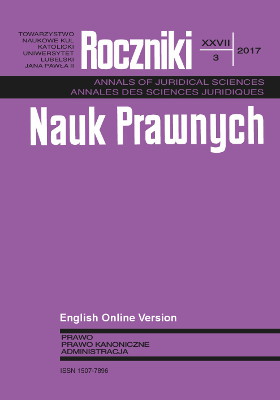Psychological Disorders in the Perpetrator of a Prohibited Acta as the Object of Judicial Consideration in the Procedure for Petty Offences After 1 July 2015
Psychological Disorders in the Perpetrator of a Prohibited Acta as the Object of Judicial Consideration in the Procedure for Petty Offences After 1 July 2015
Author(s): Iwona Bień-WęgłowskaSubject(s): Law, Constitution, Jurisprudence, Civil Law
Published by: Towarzystwo Naukowe KUL & Katolicki Uniwersytet Lubelski Jana Pawła II
Keywords: insanity and diminished sanity in the Petty Offences Code; judicial and psychiatric diagnosis in petty offences procedure; mandatory defence in petty offences procedure
Summary/Abstract: The subjective capacity of an offender to be assigned guilt is determined by such circumstances as the attainment of the age required by the law and a suitable mental state. Psychological disorders, which are the source of insanity or diminished sanity as regulated by the Petty Offences Code, lead to a considerable reduction of the capacity to recognise the significance of an act or direct one’s conduct, and this in turn leads to the exclusion of guilt or restricts responsibility under the Petty Offences Code. The existence of doubt regarding the mental state of an offender implies the appointment of expert psychiatrists by a competent judicial body in order to conduct a psychiatric examination. The doubt must be reasonable and objective, though, supported by evidence or observations of the judicial body. The opinion of an expert psychiatrist is pivotal to the proceedings as it explains the offender’s conduct during and after the perpetration of a prohibited act, which permits an assessment whether the offender’s mental condition allow him to take part in the proceedings, including self-defence. The judicial and psychiatric diagnosis also has adverse consequences for the examined person so it must not be regarded as a mere formality in every petty offence case. The act of September 27, 2013 amended the provisions for procedure for petty offences in terms of, among others, regarding provisions concerning the content of psychiatric assessment furnished by experts and the formal mandatory defence. The article aims to determine the scope of this revision and its impact on the exercise of procedural guarantees of the offender.
Journal: Roczniki Nauk Prawnych
- Issue Year: 27/2017
- Issue No: 3EV
- Page Range: 7-24
- Page Count: 18
- Language: English

